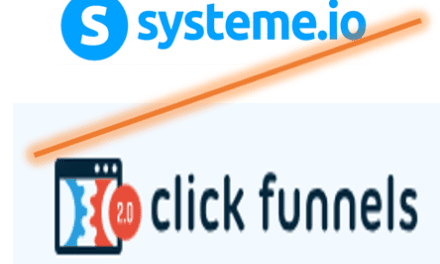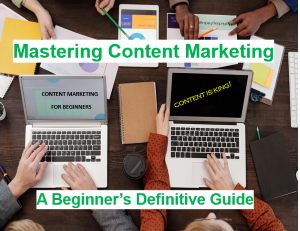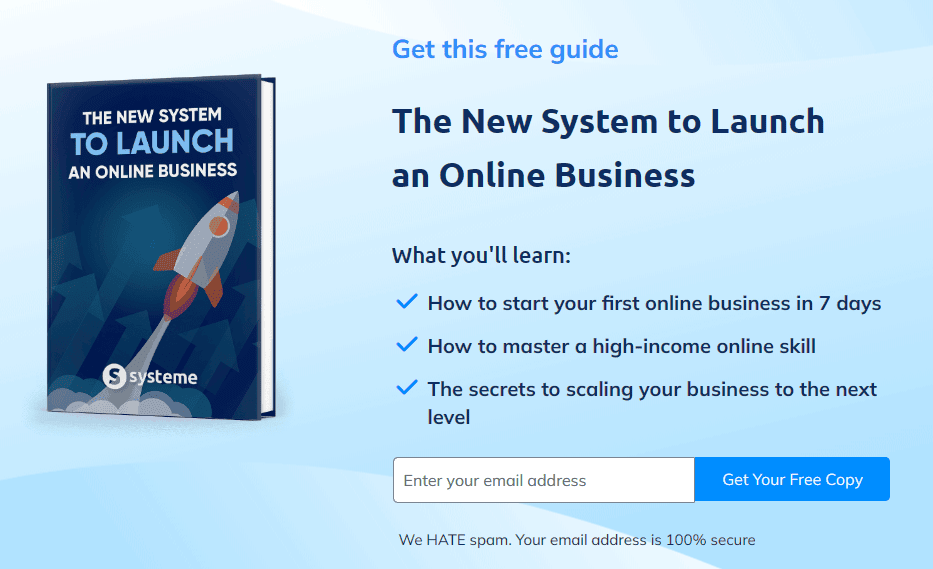Are you ready to start earning a lucrative passive income through affiliate marketing? Many new website owners, bloggers, and online marketers have succeeded in generating a significant amount of money using affiliate marketing as a source of revenue. Are you new to this game? Don’t worry; this ultimate affiliate marketing guide for beginners will guide you to success.
Please note that this article may contain affiliate links. We may receive a commission to maintain this website without any charge on your side. Visit the disclosure page for details.
Introduction
In this ever-expanding digital empire, affiliate marketing has emerged as a lucrative billion-dollar industry with awesome prospects for creators. It has become an avenue for businesses and individuals alike to monetize their online presence. Let me ask you, what exactly is affiliate marketing, and how can you leverage its potential to your advantage?
In this comprehensive guide, we will delve deep into the world of affiliate marketing and cover a few key aspects of this digital marketing strategy. We’ll start with understanding what it is, its purpose, how it works, strategies, benefits, key components, and a few top affiliate programs for beginners.
Regardless of whether you’re a seasoned marketer or just a beginner, this guide is the best for knowledge and resources you may ever need to prosper in this type of marketing business.
What is affiliate marketing?
It is good to understand what affiliate marketing is. It is a performance-based digital marketing strategy. An individual (affiliate marketer) receives commissions after promoting the products or services of affiliate marketing companies (merchants) through their marketing channels.
Affiliates, through their unique affiliate link or referral code, drive leads, sales, or certain actions and earn a generous commission. Fundamentally, it’s a symbiotic relationship where affiliate marketers drive traffic and sales for merchants in exchange for a share of the revenue.
What is an affiliate marketer?
An affiliate marketer is simply someone who promotes products and services from a merchant. Once a customer engages and buys a product or service through the affiliate link, the merchant or company tracks the activity and rewards the affiliate with the prescribed commission. It’s that simple.
Purpose of Affiliate Marketing
The primary purpose of affiliate marketing is to:
Conversions and Drive Sales: Affiliates are important since they play a critical role in converting prospects into clients for merchants and driving targeted traffic to their offers.
Expand Reach and Visibility: Affiliate programs can influence the huge network of partners to reach new audiences and expand their brand’s visibility.
Cost-Effective Marketing: The affiliate networks only pay for the actual outcome (whether leads or sales) generated by affiliates, making it a cost-effective marketing strategy.
Foster Partnerships: Affiliate marketing promotes equally beneficial partnerships between affiliates and merchants, presenting incentives for success.
Generate Passive Income: As an affiliate, you can earn passive income by promoting products or services without the need to create or own them.
How Affiliate Marketing Works

Affiliate marketing operates on a simple yet powerful premise:
1. Affiliate Network ID: Affiliates identify appropriate merchant websites and apply to promote products or services.
2. Unique Affiliate Links: The merchants approve and provide unique affiliate links or referral codes to accurately track referrals and commissions.
3. Product/service promotion: Affiliates use marketing software to advertise using various marketing channels such as email, websites, blogs, social media, or YouTube channels.
4. Visitor Engagement: When visitors click on the affiliate link and complete a desired action (e.g., signing up for a free trial), make a purchase, or provide an email, the affiliate then earns a commission.
5. Commission Compensation: The merchants track affiliate referrals and commissions through affiliate tracking software. The affiliate program pays affiliates their earned commissions either on a per-sale basis or on a recurring basis.
How to Start Affiliate Marketing for Beginners
Can you believe that all you need as a beginner affiliate marketer to start making good money online is an affiliate marketing website? You don’t need to create your own products or offer services, but if you can, the better.
Affiliate marketing is identifying a good product or service and promoting it to your audience, and the company or individual pays you a commission. Easy, isn’t it? You will now be regarded as a successful affiliate marketer.
As a beginner, you will need an affiliate marketing course to begin with. But this guide will definitely assist you in understanding the basics of an affiliate marketing plan.
Strategies for Effective Affiliate Marketing
When I started my first blog, I had little idea that it would become my opportunity to enter the world of affiliate marketing and make good money. I began to promote products and services that aligned with my niche content. Then I discovered the immense potential for passive income generation, simply by providing valuable advice to my readers. Eventually I had to use effective strategies to succeed.
Now, if you are into taking your affiliate marketing plan to the next level, then you need to have an effective strategy in place. One of the most effective strategies for successful affiliate marketing is to focus on building strong relationships with both your audience and your affiliate marketing platforms.
This means creating and offering valuable content that aligns with your target audience and creates trust with them. Furthermore, it’s important to carefully scrutinize potential affiliate marketing programs and work only with those who align with your values and brand. Another key strategy is to continually track and analyze data to optimize performance and identify areas you can improve on.
By implementing these strategies and the ones below, you can set yourself up for success in the world of affiliate marketing. If you are able to choose those programs in high-ticket affiliate marketing niches, the better!
How to Get Started with Affiliate Marketing: Top 13 effective strategies
Are you ready to start your affiliate marketing journey, turn your passion into profit, and build a sustainable online business? Then you should use the right strategies and increase your determination to succeed. You must craft a fool-proof affiliate marketing plan. These 13 exclusive strategies will set you rolling in the right direction.

1. Choose a profitable niche
The first thing to do is to select a niche or industry that aligns with your audience, expertise, and interests so as to maximize your efficiency as an affiliate. Narrow down your niche to a single sub-niche for personalized content and targeting.
2. Second, find a relevant affiliate marketing network
This is the key to your success. Carefully find, from the network, the affiliate program that is right for you. Make sure that they offer appealing products to your customers and are not just concentrating on high-paying affiliate programs. Check their reliability, commission structure and earnings potential
3. Look for your choice of affiliate marketing channel
Every affiliate marketer is uniquely different. Try to create content that connects with your audience and can drive affiliate sales using platforms you already understand. This can encourage influence and clicks. You can blog on a niche product review website, become a YouTuber, or become a social media influencer. Either will do just fine.
4. Identify and build your audience
Focus on identifying and building a loyal and engaged audience by first reaching out to them. There are several incredible avenues you can use, such as social media, content creation, SEO, and email marketing. You may opt to create an email list, which will help you directly contact your customers, whom you can send exciting offers, updates, and newsletters to.
5. Focus on creating quality content
Always strive to create valuable, informative, and engaging content that resonates with your audience and promotes the products or services genuinely. You must make sure that your content is valuable to a specific audience. Promoting an affiliate link on social media is another free way to get your content into the hands of people who might be interested in the product being promoted.
6. Promote relevant products

Choosing the right products for affiliate marketing
Only choose products or services that are appropriate to your audience and align with their pain points, needs, and preferences. Irrelevant products will make your audience disinterested and may move away from your affiliate marketing plan, denying you the expected commission.
7. Follow good business practice regulations
Only promote certified products and services and disclose your relationship with the affiliate programs. Always disclose to your audience if there are affiliate links and that you’re getting compensated for promoting the products.
8. Optimize affiliate links
You should optimize your affiliate links by strategically placing them within your content. Ensure that they blend seamlessly with your recommendations and add value to your audience.
9. Track and analyze performance
It is super important to monitor your affiliate performance metrics, such as commissions, clicks, and conversions, and optimize your strategies accordingly based on the data insights.
10. Build trust and authority
Let your customers trust your work. Establish yourself as a trusted authority in your niche by providing solutions, valuable insights, and recommendations to your audience.
11. Diversify your revenue streams
Do not put all your eggs in a single basket. Explore several high-paying affiliate programs, products, and monetization methods to diversify your revenue streams and mitigate risks. One service or program is risky, just in case it flops or yields a low return on investment (ROI). You can strategically use paid-traffic affiliate marketing if you need faster results.
12. Follow industry trends
Stay abreast of the emergence of new products, industry trends, and changes in affiliate programs to capitalize on the newer opportunities.
13. Invest in your knowledge and skills.
Be a continuous learner and invest in your knowledge and expertise through webinars, digital marketing courses, digital marketing guides, and networking. This will ensure that you stay ahead of the curve and continuously improve your affiliate marketing efforts.
Benefits of Affiliate Marketing
People are always pessimistic about marketing and ask questions such as, Is affiliate marketing a scum? The simple answer is no! It’s a legit and lucrative business when you use the right marketing strategies. It has many benefits, including:
- Has high earning potential: As an affiliate marketer, you’ll only require minimal upfront investment. It is accessible to beginners and those with limited resources. Once set up, it has the potential to earn you huge amounts of cash over time.
- You don’t need to create products or keep an inventory. You actually do not need to create or own products, handle customer service, or manage any inventory. This reduces operational overhead and logistical complexities.
- Lucrative Passive Income Potential: This affiliate marketing strategy can generate passive income streams, allowing you to earn money while you sleep.
- Free and Flexible Marketing Strategy: There is always a sense of flexibility in terms of working hours, location, and strategies. You will enjoy freedom and autonomy, choosing your ideal working time.
- Is a Scalable Business Model: Affiliate marketing is expandable. You will be able to scale your earnings by expanding your audience, diversifying revenue streams, and optimizing strategies.
Components of Affiliate Marketing
Affiliate marketing requires several mechanisms for it to work perfectly. Let’s look at the most important aspects:
- The Merchant:
This is the individual or company that owns the product or service you’ll be promoting through the affiliate program. They will be your employer as long as you are directing your subscribers to their products or services.
- Affiliate
You, as the affiliate marketer or entity who will be promoting the merchant’s services or products, are the “affiliate.”. You must have a choice of preferred marketing channels for promotion purposes.
- The Affiliate Network
This is an important intermediary platform that will connect you and the merchants. The network will be responsible for facilitating reporting, tracking, and payments for your marketing activities.
- Affiliate Link
This is the unique URL or referral code that will be assigned to you to track your referrals and commissions accurately. You cannot get paid without this link; otherwise, how will the merchant know that you are the one who referred that customer there?
- Commission Structure
How will you be paid? The agreed-upon method for calculating and paying your commissions must be there. It dictates modalities of payment based on a percentage of sales, a flat fee per sale, or a recurring commission for the subscription-based products.
- Tracking Software
This is an important marketing tool in the affiliate marketing business. It is software normally used by merchants to track your link clicks, conversions, referrals, and commissions accurately. Nobody gets cheated here; it’s a perfect gadget which makes sure that everything is fairly done.
PPC vs. CPC: Understanding the Difference
There are several methods of affiliate marketing advertising. It offers a plethora of strategies to help you succeed in earning commissions and driving sales. The possibilities are endless; all the way from email marketing and video content to social media promotion and blogging, every aspect is laid bare.
But two unique features need to be well understood: pay-per-click (PPC) and cost-per-click (CPC). What are their differences, then?
The two are often used interchangeably but refer to two different aspects of the digital advertising model.
Pay-Per-Click (PPC)
This is a pricing model where advertisers pay a fee each time someone clicks on their ad. This is a common phenomenon used in marketing to track affiliate commissions and referrals. It means that you only get paid when your referral ad actually drives traffic to the website.
Cost-Per-Click (CPC)
It is the actual cost an advertiser will pay for each click on their ad. The determining factors are competition, bid amount, and ad quality. This model is suitable for high-ticket affiliate marketing.
You must understand the difference between these two terms in order to optimize your advertising budget and drive meaningful results. You got to weigh your advertising and the benefits you’ll get to avoid going into a loss instead of profits.
Top 20 Affiliate Marketing Platforms for Marketers
Affiliate marketing websites and platforms, if put together, can make a mountain, if not a big hill. There are many, but the most important aspect of marketing to consider are relevancy, commitment, and engagement. There is nothing like autopilot, hands-free, or easy cash in affiliate marketing. You got to have an excellent affiliate marketing plan and work extra hard to gain a coin. Below are 20 platforms fit for affiliate marketers:
1. Amazon Associates
2. TubeBuddy
3. ClickBank
4. Digistore24
5. ShareASale
6. Commission Junction (CJ Affiliate)
7. Systeme
8. Rakuten Advertising (formerly LinkShare)
9. eBay Partner Network
10. Moosend
11. Shopify
12. Bluehost
13. GetResponse
14. Semrush
15. AWeber
16. ConvertKit
17. Mangools
18. VidIQ
19. Grammarly
20. ClickFunnels
Top 10 Best Affiliate Marketing Programs for Beginners
Are you now ready to dive into the world of affiliate marketing? You’ll find many great programs out there that can help you, as a beginner, get started and succeed in this exciting online marketing industry.
You only need a little bit of research and determination to start earning passive income. This can help you build your own successful online business. Many opportunities are waiting for you, so don’t wait any longer. Get started with some of these best affiliate marketing programs today and try your luck!
Moosend is the best cloud-based, AI-powered best email marketing software that lets you target your audience at scale.
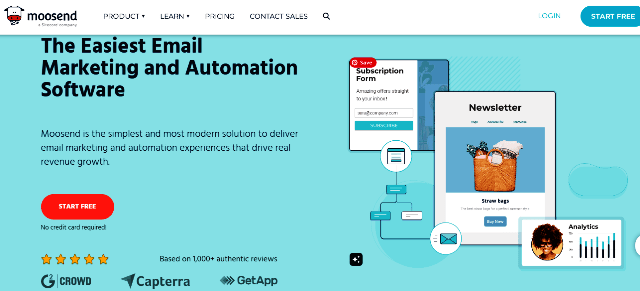
TubeBuddy: is a priced browser extension and toolkit tailored for YouTubers.
GetResponse: Top-rated, affordable email marketing platform with various tools to help affiliates reach their business goals.
Systeme.io: An integrated online business platform that provides entrepreneurs with comprehensive tools to build and automate their businesses.
Mangools: A simple but powerful SEO suite made for an effective SEO workflow.
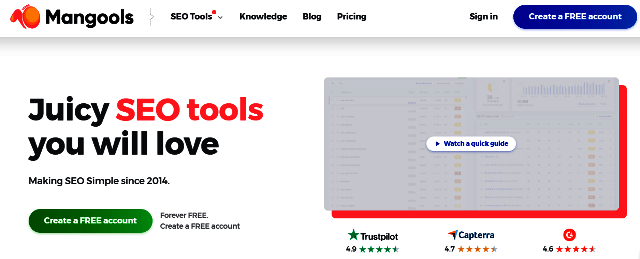
Livechat: is an online communication software tool that allows you to chat with your website visitors in real time
Chatbot: an intuitive computer program that simulates human chat through text chats, voice commands or both.
Pricelessportal: Hotspot for digital marketers looking to level up their businesses through done-for-you digital products
VidIQ: is a comprehensive YouTube optimization and analytics software suite designed to empower content creators and marketers on the platform’s video optimization.
Botsify: A full-autopilot, powerful AI chatbot to automate your customer journey through voice AI agents
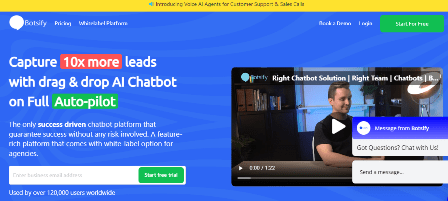
Conclusion
If you truly want to generate unending passive income you’ll be proud of, try affiliate marketing! It has a wealth of opportunities you can harness to expand your business and drive crazy sales at the same time. So, the next big idea is to understand affiliate marketing essentials, implement effective strategies to the letter, and leverage top affiliate programs in high ticket affiliate marketing niches
. You will now be embarking on a rewarding journey towards online marketing victory. So, seize the moment, harness the power of affiliate marketing, and unlock your full potential in this dynamic digital marketing realm.
Lastly, Affiliate takes time. As you strive to make your first affiliate sale, set new goals and continue experimenting with different strategies.
Visit this blog’s resource page for more insights


